There are countless benefits to owning a home gym, but having a full-fledged setup at your disposal won’t be as effective if you’re constantly on the go. After all, you can’t exactly tote your home gym essentials with you during travel without a freight truck and a ton of patience. The best portable home gyms can help you stay on top of your fitness goals wherever you roam, packing in loads of challenging, engaging workouts into their compact, totable silhouettes.
Many top-performing portable home gyms focus on resistance training, which can be ideal for building muscle and tackling cardio during exercise while still keeping setups compact and convenient. (1) As such, you need to think through a few things — namely, how the resistance is created and how much you can work against — when deciding on a worthwhile profile for your training regimen. To help you filter your results, we tested and researched dozens of popular profiles to land on our favorite portable home gyms available today.
The Best Portable Home Gyms of 2025
- Best Portable Home Gym Overall: TRX Home2 System
- Best Smart Portable Home Gym: MAXPRO Fitness Cable Home Gym
- Best for Portable Home Gym for Strength Training: Jaquish Biomedical X3 Bar
- Best Compact Portable Home Gym: LIT Method AXIS Smart System
- Best Lightweight Portable Home Gym: Gorilla Bow Travel
- Best Budget Portable Home Gym: Rogue Tube Bands
- Best All-in-One Portable Home Gym: BodyBoss Home Gym 2.0
How We Tested
The BarBend team is made up of competitive athletes, certified personal trainers, and lifelong fitness enthusiasts. In testing our 12 available portable home gyms, we used a multi-point methodology and rated each piece of equipment on a scale of 1 to 5.
Naturally, we first looked at the overall size of the exercise equipment — could these examples of compact exercise equipment be easily toted around for on-the-go-training? We also reviewed how simple each setup was, how engaging the workouts felt, and how challenging the available resistance was during exercise.
Our testers also looked at how efficient these portable home gyms could be as an alternative to their traditional training regimen and workout equipment. While some may want to use these portable home gyms day in and day out, others could view them as worthwhile replacements for staying in shape when their normal home workout routines aren’t feasible — a typical dilemma for jet-setting individuals.
Best Portable Home Gym Overall: TRX Home2 System
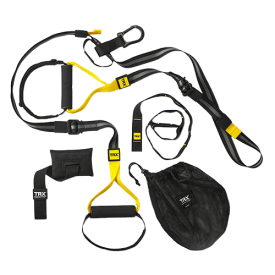
The TRX Home2 System provides a set of straps that you can incorporate into both strength and cardio training. The TRX system is based around seven classic exercises — the pull-up, push-up, lunge, plank, squat, rotation, and hinge — all of which can be modified to create varied workouts.
Specs
- Price: $229.95
- Footprint: N/A
- Workout Type: Bodyweight Resistance Training
- Available Resistance: Dependent on Your Bodyweight and Angle
- Accessories: Door Anchor, Suspension Anchor, Mesh Bag
Many of the best inventions are built to serve a need. That’s the story for the TRX Home2 System, which was created by Navy SEAL Randy Hetrick in 1997 as a means to get in a solid workout during deployment where gym equipment was few and far between. While the system has evolved from its rugged roots, we still think TRX is the best portable home gym thanks to its versatility, simple setup, and convenient storage.
The TRX Home2 System features a sturdy nylon webbing strap with a weight capacity capable of supporting up to 350 pounds across the soft foam handles that also double as adjustable foot anchors. Additionally, you get a door anchor that uses the physics of a closed door to support your frame during exercise, as well as a suspension anchor and carabiner allowing you to clip onto a nearby squat rack, tree, pole, or other sturdy structure.
Having previously owned a Home2 System and with regular access to a unit at my local gym, I enjoy how simple it is to get this portable home gym up and running. After getting your equipment out of its lightweight and convenient mesh carry bag, just wrap your base strap around your structure or tuck the door anchor near the hinges of a door frame and shut the door.
From there, you can easily lean into your starting position for a wide range of TRX exercises targeting full-body strength and conditioning like push-ups, pull-ups, lunges, and others. You are working solely against your bodyweight, though, so athletes needing extra resistance may want to opt for a portable home gym with resistance bands or cables.
I do recommend choosing your anchor point wisely, though, especially when using the door anchor. Speaking from personal experience, you can put a lot of stress across the framing when in an angled workout, which can lead to some scary creaks and potential damage to your abode.
Additionally, we like how TRX compliments the Home2 System with a convenient TRX Training Club app, which is free for a 30-day trial and available afterward for $7.99 or $19.99 monthly, depending on whether you want access to instructor-led live classes or not.
According to our tester, Billy Brown, a certified CrossFit and weightlifting coach, this service can provide a thorough library of over 1,000 workouts targeting strength, mobility, and cardio. “I like the app because it helps beginners get a handle on what you can do with TRX,” he states in reference to the platform’s ideal demographic. Because of this introductory arrangement of workouts — and the fact that you have to pay for the service — he rates the app at a 3 out of 5, noting that more experienced TRX users may find the library underwhelming.
This beginner-friendly app may be more helpful than you originally perceive, though. According to some customers, the included instructions — which outline how to set up your TRX and how to align your body for certain exercises — can be difficult to follow. “I find the large poster is cumbersome and, sometimes, the two photos don’t explain the movement well,” says one customer review.
Read our full TRX Home2 System Review.
Best Smart Portable Home Gym: MAXPRO Fitness Cable Home Gym
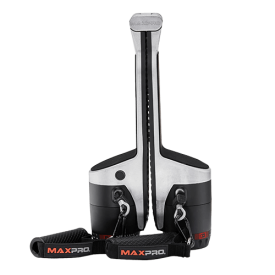
This compact cable machine packs in up to 300 pounds of resistance to a footprint that measures just 6.77 square feet. Plus, the MAXPRO Fitness Cable Home Gym is Bluetooth compatible for easier data monitoring and logging throughout your fitness journey.
Specs
- Price: $979
- Footprint: 16″ L x 10″ W x 4″ H
- Workout Type: Cable Resistance Training
- Available Resistance: 5-300lbs
- Accessories: Quick Connect Long Bar, Workout Handles, Ankle/Wrist Straps, Door Mount Brackets
Despite their small profiles, portable home gyms can come equipped with plenty of tech-heavy features like Bluetooth connectivity, integrated fitness apps for workout instruction, and more. Of the bunch, we found the MAXPRO Fitness Cable Home Gym to be the clear standout. Outside of its impressive Bluetooth connectivity, which allows you to seamlessly track your workout metrics like reps and time, training history, and progress, this slim, portable cable machine can reach a max resistance of 300 pounds.
The MAXPRO Fitness Cable Home Gym sits at a meager 1.11 square-foot footprint and listed weight of 9 pounds, earning a 5 out of 5 for portability. Despite these metrics, though, we were pleasantly surprised at the power this portable home gym brings to your travel-ready fitness setup. The resistance range was more than enough to provide challenging exercise wherever we wanted to get a sweat session in.
Toggling the resistance was also a breeze thanks to the convenient side dials with clear markings for finding that perfect level of intensity. “I like that there is such a wide range, which makes this an ideal machine for athletes at different strength levels,” says our tester.
In terms of workout variety, this machine has a ton. Aside from the full-body workouts listed in the companion app, the MAXPRO is capable of both single- and dual-arm exercise since the cables are independent from one another. The cables are also 9 feet long, which allows for overhead presses — other machines may feature shorter cables, thus limiting which exercises you can perform in a given regimen.
We did notice, though, that while the cable mechanisms are convenient and sturdy, they aren’t entirely fluid and smooth-operating at first. “The cables have a break-in period, and won’t operate smoothly out of the gate,” notes our one tester. “After a few workouts, though, I found that they started rolling like butter.”
Additionally, those wanting an extended time under tension may be displeased with the MAXPRO’s operating style. The cables don’t load eccentrically, meaning you’ll only feel the resistance during the concentric portion of your exercise — when the cables are pushed or pulled upward.
While there are benefits to both concentric and eccentric training on their own, studies indicate that eccentric loading can support maximal muscle strength and power. (2) It would be nice to have such an opportunity in this portable home gym, especially when you’re paying a premium that rivals some standalone cable machines.
Best for Portable Home Gym for Strength Training: Jaquish Biomedical X3 Bar
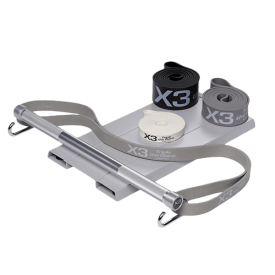
With four included bands capable of up to 300 pounds of resistance, the X3 Bar can be a suitable alternative to traditional strength training with free weights. The package includes a well-knurled barbell for added grip, as well as a convenient ground plate for easier bracing during heavy pulls.
Specs
- Price: $549
- Footprint: 10” L x 19” W x 1” H
- Workout Type: Band Resistance Training
- Available Resistance: Up to 300lbs
- Accessories: X3 Elite Bar, Ground Plate
Looking to boost your strength yet don’t have the available space for a roster of free weights, benches, and other training gear? Consider the X3 Bar from Jaquish Biomedical. Instead of training your muscles with weight plates and dumbbells, this portable home gym uses thick latex bands to tax your physique in training.
We’ve personally tested the X3 Bar and found the exercises to closely mimic our typical workouts with barbells and other free weights. “I really enjoy the feel of the bar included in this portable home gym,” says our tester. “It has great knurling, and I appreciate the bearings that make for smooth rotations during each lift.”
Plus, the included ground plate — essentially a platform for upward pulls — takes up just 1.32 square feet of flooring, which is much more compact than, say, a standalone power rack. Additionally, the X3 Bar’s total weight of 17 pounds makes it light enough for easy carrying yet dense and durable enough for hard-nosed training.
We like this portable home gym for strength training because of its reliance on bands over other resistance methods. Banded workouts have shown to provide similar strength gains when compared to training with conventional equipment. (3) Add in the fact that the four included bands feature 15 layers of latex, a 30 percent increase over other latex bands, according to the brand, and you’re set with a profile that’s capable of challenging your muscles with each grueling session.
Additionally, swapping one band for the next is also simple thanks to the hooked silhouette of the bar, as well as the channeled underside of the included ground plate. Because of these quick adjustments, along with the range of exercises you can perform with the bar setup, we give this portable home gym a 4.5 out of 5 for versatility.
Our testers also appreciated this included plate accessory, as it made it easier to brace the bands at the bottom of a lift. Other banded workouts call for you to step directly into the band, which can lead to imbalances in your stance (and the occasional upward snap if you’re not careful).
The only thing missing from this setup, outside of a convenient carrying case (sold separately) is a clear indication of how strong the bands are. There aren’t any stamped measurements across the bands, so you’re relying on feel when determining how much intensity you want to work against in training. We had no issues with creating a challenging workout, and the bands are identifiable given their differing thicknesses, but it would be nice to have a numeral tied to the resistance for a clearer, more defined training setup.
It’s also worth noting that the ground plate, while effective, is pretty compact at just 1.32 square feet. This could make it unusable for larger athletes or those that prefer a wider stance in training. Be sure to keep this in mind when considering this X3 Bar for your next on-the-go training session.
Best Compact Portable Home Gym: LIT Method AXIS Smart System
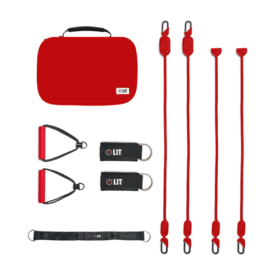
These resistance bands from LIT Method allow you to perform a wide variety of core movements. Plus, the corresponding app provides you with direction, motivation, and a path of progression.
Specs
- Price: $199
- Footprint: 3.5” L x 1.5” W x 1” H
- Workout Type: Tube Band Resistance Training
- Available Resistance: Up to 200lbs
- Accessories: Handles, Ankle Cuffs, Universal Anchor, Carrying Case
While all of the home gyms in this guide are portable, there’s still something about a profile that can pack up neatly into a carrying case that fits in practically any pocket or gym bag. Taking up just 5.25 square inches when stored, the AXIS Smart System from LIT Method is one of the smallest footprints we’ve encountered. This small footprint easily earns this training kit a 5 out of 5 in terms of portability.
You receive four smart resistance bands in each kit — two 0- to 60-pound bands and two 30- to 100-pound bands. These accessories are “smart” due to the built-in sensors near the carabiners. When connected to your phone and compatible LIT Method app, you can seamlessly track key metrics mid-workout including your reps, “weight” lifted based off of the showcased resistance, time under tension, and calories.
Additionally, the AXIS Smart System comes with two comfortable handles, two ankle cuffs, and a universal anchor that can be used with a door, sofa leg, tree, or other sturdy structure. Jake Herod, a BarBend tester and certified nutrition coach, enjoyed how seamlessly it was to swap out these attachments when setting up for a session. “I like how the accessories rely on a carabiner, so it only takes a couple seconds to change out attachments for an arm or leg workout,” he says. “I actually took this on a beach trip with me this summer and it was perfect for what I needed.”
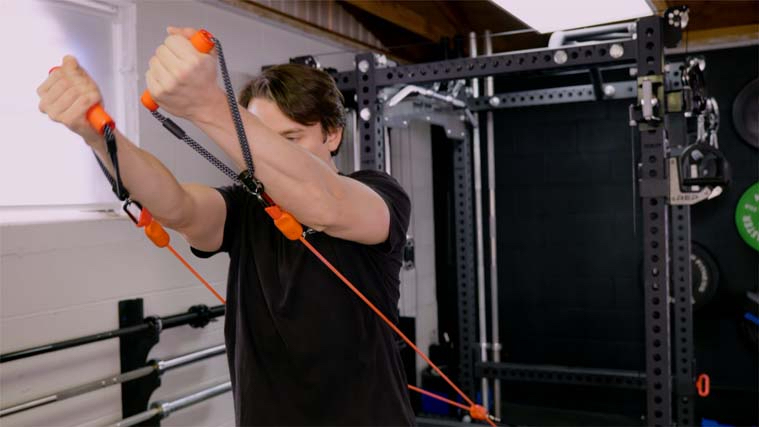
We also found that LIT Method offers a barbell attachment for barbell-centric exercises, but this accessory isn’t included in the base bundle and retails for $90, almost half of the entire kit itself.
We also appreciated how personalized the training experience was with this portable home gym. The integrated app delivers a customized workout plan daily to your device based on your logged abilities and metrics. This fine-tuned regimen helped each workout remain efficient and engaging, and the roster of instructors easily kept our attention through the over 3,000 on-demand classes, another feature offered through your app subscription.
The LIT AXIS Smart System can also be a treat for beginner athletes since the built-in sensors are capable of instant feedback on your form. In testing we found this to be a great resource when trying out new exercises across the six available categories — Pilates, Strength Training, Cardio, Core, Rowing, and Recovery.
As totable and impressive as this portable home gym is, however, we think it’s more of a fit for beginner or intermediate athletes due to the limited resistance of the bands. We had a few occasions where we were easily able to push through the movements without much challenge despite having resistances maxed out across the setup, and we don’t doubt that stronger athletes could have similar experiences.
Best Lightweight Portable Home Gym: Gorilla Bow Travel
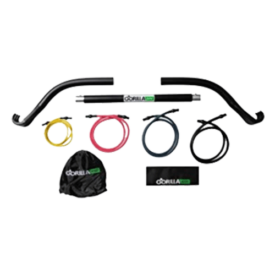
The Gorilla Bow Portable Home Gym Resistance Bands and Bar System come in three different options: lite, travel, and original. The original comes with four resistance bands that total 110lbs worth of resistance and a bar that is 1 inch in diameter and 56 inches long.
Specs
- Price: $259.80
- Footprint: 56” L
- Workout Type: Tube Band Resistance Training
- Available Resistance: Up to 350lbs
- Accessories: Band Carrying Bag, Band Wrap
Toting the Gorilla Bow Travel around is a breeze for multiple reasons. For one, the included bands come with a handy pouch to keep everything neat and tidy in your bag. Additionally, the bow itself breaks down into three separate pieces and weighs just 6 pounds in total. Don’t let the compact, lightweight design of this portable home gym fool you, though. The bow is capable of providing up to 350 pounds of resistance to your training regimen.
I’ve had a good bit of experience with this portable home gym, having owned a unit for over two years, and can attest to its effectiveness. I really enjoy how similar the workouts are to traditional barbell training, and the tubed bands are resilient enough for plenty of extended use over time.
From personal experiences, though, I do recommend taking your time when finding an ideal brace point for presses, though. The band had a tendency to roll up my back toward my neck during my initial sessions with the bow, so you need to understand how to stabilize the resistance during training. It’s a learning curve, indeed, but one that’s easily mastered after a few go-arounds.
We also found the Gorilla Bow Travel to be an excellent tool for interval training because you can have up to four bands strung onto the bow at once. “I can brace one or two bands underneath my feet for heavier rows, and then quickly step off a band for a finishing superset,” says our tester.
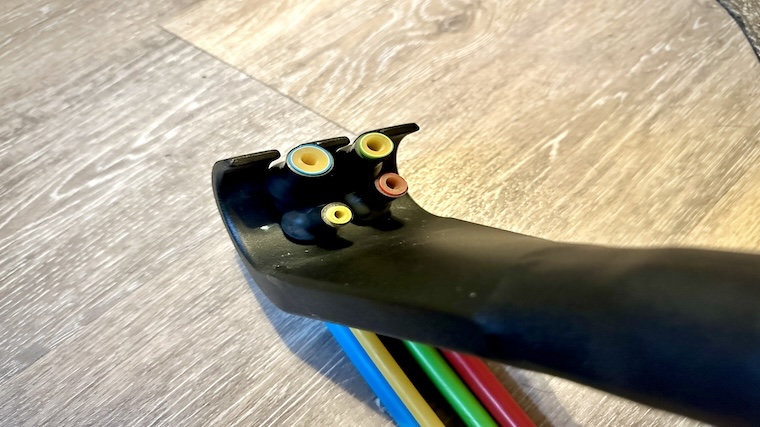
The bands are color-coded for easy identification, too, and the resistance poundage is also labeled clearly at the end of each tube so there’s no questioning your intensity during training.
You can also pair the Gorilla Bow Travel to the brand’s companion app for $14.99 monthly. This service gives you access to unlimited live and on-demand fitness classes led by expert instructors, which can be a useful tool when trying to curate a workout regimen surrounding this portable home gym. While I personally found it easy to pick up given my history in barbell training, others may need a little extra guidance at those beginner stages.
Finally, it’s worth noting that the base bundle for this Gorilla Bow Travel comes with four tube bands weighing 10, 20, 30, and 50 pounds, respectively. We give this bundle a 4 out of 5 in terms of resistance, though, for one key reason — while 110 total pounds may be good for beginner users, stronger athletes may easily outlift this max intensity.
Expansion packs are available for band options between 40 and 100 pounds, but they will cost extra. If you really want to challenge yourself with this device, expect to add a few more items to your cart prior to purchase.
Best Budget Portable Home Gym: Rogue Tube Bands
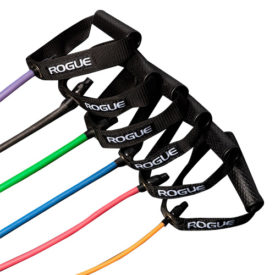
Rogue Tube Bands are perfect for performing banded versions of standard accessory moves, like curls, rows, and overhead presses. Throw them in your gym bag for your next workout.
Specs
- Price: $75
- Footprint: N/A
- Workout Type: Tube Band Resistance Training
- Available Resistance: Up to 60lbs
- Accessories: None
Need to keep your spending on a portable home gym as minimal as the device’s footprint itself? Take a gander at these Tubed Bands from Rogue Fitness. We appreciate how Rogue offers these workout tools individually as well as a package deal, although we feel the “Complete” bundle of all six bands is the best value for $75. That’s a savings of $58 if you were to parcel out your kit piece by piece.
While in use, we enjoyed how comfortable the attached handles felt in our grasps, and the latex felt plenty durable for extended training sessions. For this reason, we rate the durability of this portable home gym option at 5 out of 5.
The textured knurling across the fixed handles was easy to grip, as well, and our tester noted that they felt no sense of slippage during training. They did notice an audible feedback, though, that could be irritating for some athletes. “My only major complaint is the loud squeaking noise these resistance bands make while in use. I believe this obnoxious sound is coming from the metal joint that connects the handle to the band itself,” they said.
We also want to note that the handles cannot be detached, so you cannot perform exercises with varying attachments like ankle cuffs. This may be a detriment to athletes wanting a variety of attachment points to support their resistance band workouts.
There’s also no anchor attachment with this Rogue bundle, so you can only anchor these tubed bands underneath your feet during training. Other tubed band kits feature a door anchor that slides into a door frame, which gives you the opportunity to use your house elements as a brace for certain movements like forward presses or triceps extensions.
That said, we were able to get creative for some makeshift brace points. “I found that I could loop these bands around the support post in my basement or balusters on my back deck to create a solid anchor for training,” says our tester.
Rogue’s Tube Bands are available in six levels of resistance, each with a prescribed color. The orange band is the 10-pound band, the red measures 20 pounds, blue for 30 pounds, green for 40 pounds, black for 50 pounds, and purple for 60 pounds.
It’s key that you remember this color-coding system, as there are no markings or listed resistance poundage across the bands themselves. We recommend having a written key near your workout station or on your phone to help you remember which band is which.
Best All-in-One Portable Home Gym: BodyBoss Home Gym 2.0
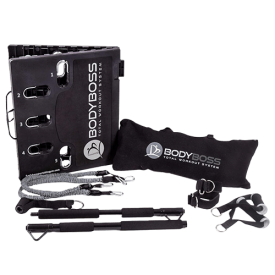
This all-in-one portable home gym boasts a good mix of attachments to support your workout needs, coming equipped with a set of handles, wrist/ankle cuffs, and a collapsible barbell. Plus, the 20.1-inch by 15.9-inch foldable platform features multiple anchor points, allowing you to change your stance angle and resistance without much difficulty.
Specs
- Price: $179
- Footprint: 20.1” L x 15.9” W x 2.8” H
- Workout Type: Tube Band Resistance Training
- Available Resistance: Up to 60lbs
- Accessories: Foldable Platform, Handles, Collapsible Workout Bar, Wrist/Ankle Straps
Having a portable home gym that covers all bases across the bundle is a definite perk. After all, you’re not reliant on extra purchases or pre-existing structures to help facilitate your daily workouts. With a foldable platform that serves as the anchor and three included attachment options, the BodyBoss Home Gym 2.0 checks all the boxes when it comes to all-encompassing fitness gear that’s complete from the start.
We appreciate how convenient the entire setup was, and liked how the brand makes everything convenient for travel. You get a compact carrying case for the included bands and attachments, and the platform folds into itself for easier carrying — there’s even a handle to create a briefcase-like aesthetic. Additionally, the carabiners are well built and durable, and our testers found no issues when swapping out attachments or anchoring to a different point across the base board.
The BodyBoss Home Gym 2.0 can be an excellent option for athletes tight on space, too. The platform takes up 2.22 square feet of space, meaning you’re plenty capable of getting a session in across a space that takes up less flooring than your standard bath mat. If you do want to anchor to an existing door frame, the brand has you covered, too, with a complimentary door anchor thrown into the kit as well.
Portability aside, though, this may not be the best solution for every athlete, which is why we give this kit a 3.5 out of 5 for versatility. According to the brand, the included bands are only rated at 30 pounds. Even when combining the two for exercises like back squats and deadlifts, you’re still only pulling a measured 60 pounds of band resistance, which may be too limited for stronger athletes.
Additionally, it’s worth noting the length of the included tube bands. At 30 inches long, you may be restricted to pulling motions or forward presses, since getting these profiles to stretch overhead may be asking too much of their structure and resiliency. Still, though, for a quick solution to travel-friendly training that leaves no stone unturned, it’s hard to find a complete bundle as well-rounded as this pick from BodyBoss.
[Related: Try These 5 Hotel Room Workouts to Stay Fit on the Road]
How We Choose the Best Portable Home Gyms
Finding the best portable home gyms is a more involved process than looking for a compact piece of gym equipment with an additional carrying case. In determining our list, we looked at multiple factors outside of just each profile’s portability in an effort to give you as robust a list as possible. Read below to get a better understanding of how these components factored into our curation process.
Footprint and Storage
Fitness equipment isn’t the most convenient category when it comes to storage and portability. Oftentimes, wherever you initially place the gear is where it’ll live for however long you own it. So, to align with the “portable” moniker, we looked for profiles that featured lightweight designs that could be toted with ease from workout to workout. We looked for home gyms featuring storage-friendly components like foldable silhouettes or carrying cases, which helped promote a more travel-ready aesthetic.
Additionally, we understand that portable also lends itself to compact training, so the equipment chosen for this round-up had to be space-saving in nature. Outside of the foldable components or packable frames, we looked at the in-use footprint of each mechanism, aiming for a square footage under 2.67 square feet. Essentially, if our stance atop the home gym could fit within a small welcome mat, the device was in contention.
Resistance Levels
In testing, we found that many of the top-performing portable home gyms favored resistance training as the go-to workout discipline. This made sense to us, as studies have shown that many improvements in physical function and athletic performance are associated with the increases in muscle strength, power, endurance, and hypertrophy observed during resistance training. (1) Additionally, you don’t need a lot of space to facilitate challenging exercises against an outside force.
To make your workouts worthwhile, though, the resistance at play needs to provide some challenge and room for growth to help support progressive overload. So, we tested a variety of profiles offering varying levels of resistance suitable for beginners and advanced athletes alike. These levels ranged from a light 10 pounds all the way up to 350 pounds and more.
We also looked at how versatile the setups could be in terms of angles, as changing this metric can also make a workout more or less taxing across your physique. We won’t get into a detailed lesson in physics, but changing your exercise angle can alter which muscle fibers are working in a given set. This can help create a challenging setup, which is ideal for supporting progressive overload, which is vital in generating progression in your fitness. (4)
Workout Variety
Keeping your regimen fresh with new and engaging movements is key to maintaining your interest in training. We looked for portable home gyms capable of supporting a variety of pushing and pulling motions across their resistance training setups. We also included portable home gyms with multiple accessories that allowed for varied grip and attachment points in training. This can open up your exercise library to lower-body-specific and upper-body-specific movements alike, depending on your decision to use the available handled grips or ankle cuffs.
We also looked at how the portable home gyms anchored themselves to support the stretched cables or resistance bands. Did the setups allow for varied angles, or would we be limited to a standard positioning over the structures themselves? We included a handful of picks showcasing both setup options to cater to more training tastes.
Setup
If you’re looking for a portable home gym, you don’t want the setup time before your workout to be long and arduous. We included profiles that required minimal assembly, as well as silhouettes that could be easily broken down once your training was complete for the day. Some home gyms were more involved, requiring some anchoring steps to a nearby door or structure, but regardless, we tried to keep pre-training setups to less than five minutes across the board.
In our opinion, five minutes was a good benchmark because this isn’t too taxing of a timeframe yet still allows for any safety checks where needed. A simple setup and breakdown can also be helpful when training on a time crunch, like before you have to catch a flight or in-between meetings. We also realize that portable home gyms can rarely stay built or in a given place for extended periods, so having the ability to get in, train, and get out is an absolute must.
[Read More: The Best Adjustable Dumbbells for Your Home Gym]
Benefits of Portable Home Gyms
Portable home gyms can be excellent for any athlete regularly on the road or those looking for a workout solution to match their cramped living arrangements. Whether you need to find a way to get a solid training session in during travel or just want a compact option for sessions outside of your normal training center, below are some benefits that can be reaped by adding a portable home gym to your fitness arsenal.
On-the-Go Training
When you have a portable home gym at your disposal, you can turn virtually any location into a bonafide training center. This can be ideal for athletes that routinely travel for work, as there are fewer excuses to skip a sweat session. Staying diligent in training and maintaining a consistent regimen is the best way to see progress and support your healthy well-being. (5)
Work Out in Small Spaces
Portable home gyms are smaller and more compact than other full-body workout machines you’d find on the market. Their footprints are much smaller to help support their travel-ready designs, meaning they take up less space both in use and on the go. As such, portable home gyms can be viable options for those that may not have the space available for a full-fledged cardio machine or other cumbersome piece of training equipment.
Additionally, portable home gyms are designed to be lightweight so you can carry them from place to place with ease. While this featherweight aesthetic can do wonders for passing through bag checks and weight limits at the airport, it can also make it easier to train in any room of your choosing throughout your home — even second and third floors. There’s also no extra weight that could leave you weary about crashing through your upstairs flooring during workouts.
[Related: The Best Airport Workouts for Staying Fit During Holiday Travel]
Full-Body Workouts
If you’re looking for a home gym that can support both upper-body and lower-body exercises, portable home gyms can easily fit the bill. Given their reliance on resistance training, typically in the form of bands, these machines can be set up to train your legs, arms, chest, core, and shoulders. This can allow you to create a worthwhile regimen with enough challenges strewn throughout to keep your training consistency intact when getting to the gym is not feasible in your schedule.
How to Choose the Best Portable Home Gym
Finding an ideal portable home gym for your needs requires a few things. First, you need to make sure that the machine can support your training with the right amount of intensity and challenge. Second, you’ll want to look for a profile you can actually tote around — what’s the use of a “portable” machine that can’t be transported, after all? Below are a few additional factors to consider when deciding on the best portable home gym for your training regimen.
Portability
Odds are that you’re looking for portable home gyms because you want to take your workouts with you when on the road. So, be sure that the profile can be transported with little difficulty. If your portable home gym is a singular structure, look at the dimensions and ensure it’s capable of fitting in your gym bag or luggage.
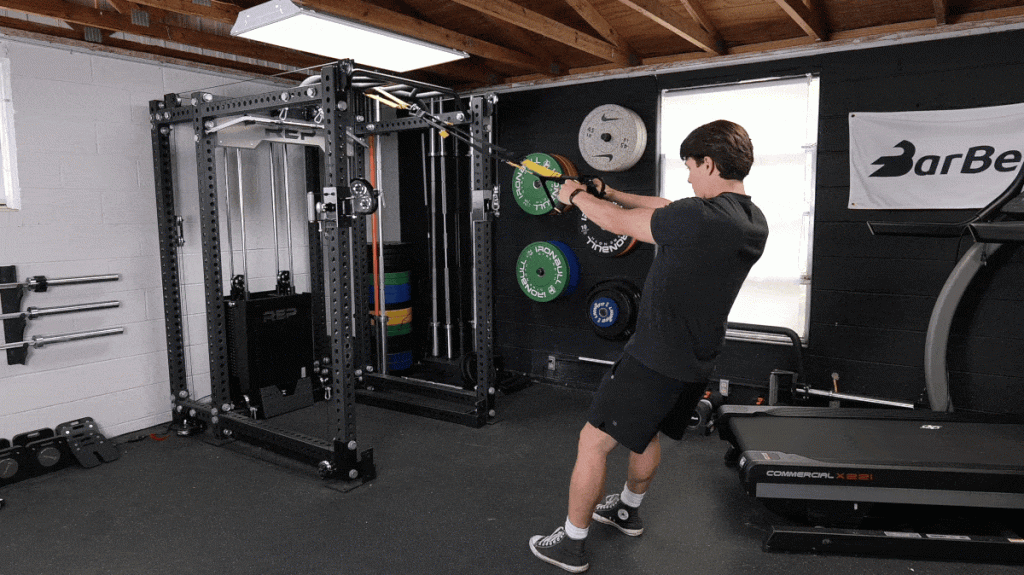
It can also be wise to pay attention to the weight of the item, as you don’t want to be lugging around a cumbersome piece of equipment with each trip. This can be a good way to spoil your interest in the training tool, making it more of a homebody than a travel-ready convenience.
[Read More: The Best Compact Exercise Equipment for Any Small Space]
Resistance Levels
The notion behind portable home gyms is to allow for worthwhile training when your normal routine isn’t feasible. So, you’ll want to ensure that your portable gear can be just as efficient in generating a solid workout as your go-to machines and equipment. Take a good look at the available resistance levels available across the profile and compare it to your current fitness levels. If you think the intensity will be too easy for you, try to find a more accommodating design.
Additionally, you don’t want to have a portable home gym that you’re maxing out from the start. Having a machine that can support your growth and progress is just as important as finding a silhouette that fits your current strength levels. So, be sure to look for a portable home gym that features a gap between its maximum resistance and your maximum output.
This can also be a good way to maintain a sense of motivation with your gear — think of that max resistance as a boss level or final challenge along your journey. Your interests and determination to conquer this feat can help you stay more diligent in training, leading to repeated equipment use as you chase down that metric.
Packing and Convenience
When looking for a portable home gym, you’ll want a profile that packs easily into your bag, or at least, isn’t too big of a profile in your arms during transport. Consider home gyms that come equipped with a convenient carrying case, as these accessories can help keep all your essentials stored neatly in one place while still maintaining a compact aesthetic.
If your portable home gym doesn’t offer a carrying case or tote, make sure the components can be wound up or broken down for easier toting. From there, you can find a storage method that works best for your setup rather than trying to work around a silhouette that’s rigid and less versatile.
Price
Finally, portable home gyms are intended to be useful tools in your training regimen, but they shouldn’t break the bank. Many portable home gyms can be found with cheaper price tags than other fitness equipment, but it’s always good to crunch some numbers before adding profiles to your cart. Make sure your portable home gym fits into your budget, as it needs to comfortably slide into this location before it can ever slide into your carry-on.
Final Word
As much as we’d all like to have a complete home gym within arms reach, life and travel arrangements don’t always grant us access to such environments. Portable home gyms can help you maintain a sense of consistency with training, regardless of your location. These compact, totable tools often focus on resistance training to generate progressive, challenging workouts in as small of a footprint as possible.
When deciding on a worthwhile portable home gym, your natural first consideration should be how easily the device is to carry around. There’s no sense in purchasing a “portable” piece of gear if it’s going to be a burden during travel. Additionally, you want a machine that can provide a good intensity to your alternative training regimen. You’re making an effort to maintain consistency, after all, so you want a device that’s more taxing than simply going through the motions. Using these tips and round-up as a guide, you can be well on your way to keeping your fitness goals top of mind, wherever life takes you.
Best Portable Home Gyms FAQs
Is a portable home gym worth it?
Yes, a portable home gym can be a great solution to maintaining fitness levels when dealing with travel or working around confined spaces. While the challenging workouts are limited to the amount of resistance levels baked into their respective designs, portable home gyms can be worthwhile solutions for maintaining a sense of training consistency, regardless of where life takes you.
What is the best portable home gym?
For our money, we prefer the TRX Home2 System thanks to its simple setup, minimal gear requirements, and compatibility with the TRX Training Club app which gives you access to instructor-led workouts and helpful training advice.
How do I choose a portable home gym?
When choosing a portable home gym, you’ll first want to see how convenient the profile is to transport. Look for devices that break down easily or feature a compact carrying case for easier toting from workout to workout. Additionally, it can be wise to opt for a portable home gym with enough resistance levels to support your current and future fitness levels. This can be great for promoting challenging workouts for extended periods, leading to better progressive overload and maintaining physical well-being.
References
- Smith, B. K., & Kirk, E. (2002). Resistance training and physical exercise in human health. Nutrition and Enhanced Sports Performance, 55–64.
- Vogt, M., & Hoppeler, H. H. (2014). Eccentric exercise: Mechanisms and effects when used as training regime or training adjunct. Journal of Applied Physiology, 116(11), 1446–1454.
- Lopes, J. S., Machado, A. F., Micheletti, J. K., de Almeida, A. C., Cavina, A. P., & Pastre, C. M. (2019). Effects of training with elastic resistance versus conventional resistance on muscular strength: A systematic review and meta-analysis. SAGE Open Medicine, 7, 205031211983111.
- La Scala Teixeira, C. V., Evangelista, A. L., Pereira, P. E., Da Silva-Grigoletto, M. E., Bocalini, D. S., & Behm, D. G. (2019). Complexity: A novel load progression strategy in strength training. Frontiers in Physiology, 10.
- Warburton, D. E. R. (2006). Health benefits of physical activity: The evidence. Canadian Medical Association Journal, 174(6), 801–809.